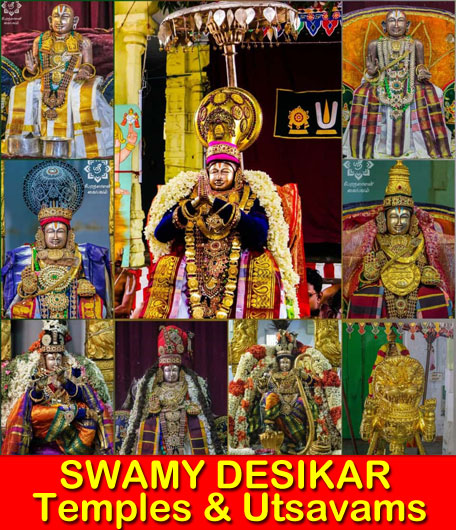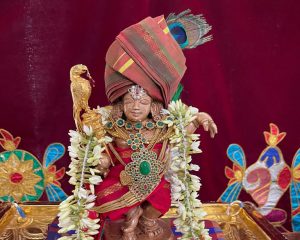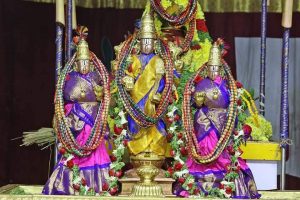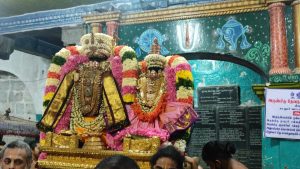Ugadi or one may call it as ‘Yugadi’ is also known as Samvatsaradi(Beginning of the Year), is observed as New Year in the two Telugu states, Andhra Pradesh and Telangana, besides Karnataka. The renowned festival would be celebrated in these regions on the first day of the Hindu lunisolar calendar month of Chaitra. This year, the festival falls on April 9, as the renowned festival would be celebrated in the month of the Gregorian calendar, as it is coinciding with Tamil month ‘Panguni’ or ‘Chithrai’ some times, a day after Amavasya, depicting the 27th star ‘Revati’. Ugadi is pivoted on the first New Moon after March Equinox.
Ugadi is being celebrated by drawing colourful patterns on the floor called ‘Muggulu’, mango leaf decorations on doors called ‘torana’, buying and giving gifts such as new clothes, giving charity to the poor, oil massage followed by special bath, preparing and sharing a special food called ‘pachadi’ , apart from visiting temples. The pachadi would be the centre of attraction in the festival that combines all flavours, ranging from sweet, sour, salt, bitter, astringent and piquant, as it is a symbolic reminder that an individual must expect all flavours of experiences throughout the newyear and must be prepared to accept both the bouquets and brickbats in life with utmost ease.
Ugadi has been an important and historic festival of the Hindus, with medieval texts and inscriptions recording major charitable donations to Hindu temples and community centres. Ugadi is also observed as a New Year by the Hindus in many other parts of India. For instance, it is celebrated as ‘Gudi Padwa’ in Maharashtra. The Sindhis, celebrate on the same day as ‘Cheti Chand’, which is the beginning of their calendar year. Manipur also follows their footsteps by celebrating in the name of ‘Sajibu Nongma Panba’. Similarly, the people belonging to the Hindu community at Bali in Indonesia celebrate the festival in the name of ‘Nyepi’. In Sri Lanka, the festival is celebrated with bubbling enthusiasm.
In Tamil Nadu, too, the people celebrate Ugadi, as the government declares holiday for educational institutions and other important places. Tamil people join their Telugu brothers and sisters in celebrating the festival with aplomb. Interestingly, a section of the people belonging to the Telugu community, including some political leaders, industrialists, cine-artistes and sportspersons speak Tamil more than Telugu at their residences, as they attach more importance to the language than their mother-tongue. Attention would be paid on special menu for lunch and dinner on the fruitful day. Ugadi emanated from Sanskrit words ‘yuga’ (age) and ‘adi’ (beginning) and it is being surmised as the beginning of a new age.
What is the significance of Ugadi, the people would ask with curiosity? It is believed that on this day, Lord Brahma had created the universe. Thus, the well-known festival is said to be the first day of the creation of the universe. It is also being felt in parts of India with a tinge of regret that Brahma has not been accorded due importance by a large number of devotees, similar to their offering worship to Lord Vishnu and Shiva with an ill-conceived notion that since Brahma lied once, he does not deserve the prayer meant for other two gods. Little do they realise that by disowning Brahma, they are meting out a step-motherly treatment to his better-half and goddess Saraswati, whom it is believed, is the inheritor, motivator and solace for the people inclined to excel in educational and academic sphere at the highest level. It is being firmly believed that without the blessings of Saraswati, a person cannot attain literacy.
The auspicious day begins early with ritual showers, rubbing the body with perfumed oil, followed by prayers.Preparations for the festival begin a week ahead.Special dishes are prepared for the occasion. In Karnataka etables olige, vobattu and mango pickles are made. In Andhra Pradesh, dishes such as “pulihora and bobbatlu are prepared in a grand-gala manner, besides the devotees opting for raw mango to mark the occasion. On the auspicious day, people wear new and attractive clothes and greet other people by offering sumptuous food. After offering worship to the almighty, they gorge on delectable delicacies that are specially prepared on this day. Prayers are offered and houses are cleaned, so as to usher in novelty and prosperity. Families get creative on this day, and draw rangolis in their home. Other traditional floor decorations also include flower petals and coloured rice.
On the occasion of Ugadi, the festival has provided fillip to the people with a hope that it would augur well for them in all aspects of life throughout the year. Importantly, marriages and important functions are fixed, keeping the Ugadi in mind. The popular festival is also known for its significance, as it creates a path for other major festivals in India to follow its footsteps with redoubled vigour.
K.V. Venugopal, Chennai.








